More Money Won’t Fix Liberal-made Immigration Backlogs
Plus moving ahead with our conservative agenda, tabling petitions and more...
More Money Won’t Fix Liberal-made Immigration Backlogs
Since I was named immigration shadow minister by Conservative leader Pierre Poilievre, it has become quickly apparent to me how much the Liberal government has broken Canada’s once highly lauded immigration system. Families trying to reunite, businesses running into red tape trying to fill job vacancies with high-skilled immigrants, and refugees fleeing persecution, everything is now taking longer than it used to since we were in goverment. Despite ample resources and staff being given to the Liberal government to fix the wait times, they continue to spiral upwards.
Since 2017, the budget of the Immigration, Refugees and Citizenship (IRCC) department has grown by 80%. Go back to 2016 and its doubled since then. And during the latest rounds of supplementary asks for additional spending midyear, the Liberal government is asking for an additional $1.2 billion in total spending to clear more backlogs, assign more funding and presumably people to process Ukrainian applicants coming to Canada fleeing the Russian invasion of their country, and other spending to supposedly improve processing times. Along with the extraordinary funding numbers, IRCC has added over 3,000 more full-time staff and conflicting numbers I have received from the Liberal government show they could now be at around 12,000 bureaucrats having basically doubled the number of people who work there since 2016.
What’s the result of all this spending and more people assigned to work there? Not better service or faster processing times. Instead we have a 2.4 million application backlog that has barely gone downwards. The federal government likes to quickly blame the pandemic but its backlog was already 1.8 million pre-pandemic. Every application is a business waiting to know whether a worker will be able to enter the workplace after failing to find a Canadian to fill the job, it’s a family waiting to hear whether a loved one will be allowed to visit for Christmas, and it’s an international student who chose a Canadian university for its quality but now holding off on signing up for another semester because their study permit is held up. These are just a few examples. The immigration backlog is a chaotic mess and the Liberals are entirely responsible.
Conservatives believe that you must put one foot in front of the other. The first thing we would undertake in government is clearing the Liberal-created backlog of immigration applications to get more workers, unite families and allow charities to sponsor refugees to safety here in Canada. Canada finds itself with over 1 million job vacancies, a record high. We would put greater emphasis on employer-driven immigration streams and address critical labour and workforce needs. Ontario already says it is short 100,000 construction workers and that problem exists across Canada. Canada is also short nurse aides, long-term care aides, hospital attendants, teaching assistants, truck drivers just as a few more examples. Those jobs need to be filled in order for other higher wage occupations and professions to function and earn higher salaries. By 2032, the expectation is that 100% of Canada’s workforce growth and 100% of our population growth will come entirely from immigration. Making sure we bring in the right people with the right skill sets to find work in the most in-demand fields will be critical.
We need a system that welcomes newcomers that choose Canada as a place to work, raise a family and start a new life. We have to ensure that families can have a reasonable expectation of reunification. Many breadwinners immigrate to Canada ahead of their families, their dependent spouses and minor children, with a hope that hard work will allow them one day to reunite in Canada together to build a new home. That was the case for my family and I know it’s a dream shared by many newcomers to Canada. We also have to speed up the recognition of international credentials and education. After all, if we attract doctors and engineers to come to our country, but create too much red tape for them to successfully obtain a license, then Canada loses out on a new doctor or engineer while their country of origin loses one as well. It’s a terrible waste of human capital, knowledge and expertise to have people wait years to enter bridging programs because of long wait times or get non-answers from their professional bodies in Canada. Conservatives will be working to promote a system whereby immigrants to Canada get a fair assessment of their skillsets and a 60-day guarantee their skills will be assessed and a path to licensure and certification is laid out for them.
In immigration committee this week, the immigration minister was called in to answer our questions regarding the terrible state of our immigration system and the new funding ask.
Watch the video to see how I challenged him on the performance of the Liberal government.
Meeting with the Ambassador of the Republic of El Salvador
This week, I had a follow-up meeting with the Ambassador for the Republic of El Salvador on labour market needs in Canada and how El Salvadorians can fill some of our workforce shortages. The Ambassador toured Alberta just a few weeks ago, noting business and workforce opportunities for people in his country. Despite missing each other due to a snowstorm in Calgary, we caught up in Ottawa to discuss what he saw in our home province. El Salvador has worked out an incredible rapid system to meet the needs of U.S. firms in a fair, rapid and legal immigration system and they are hoping to build the same type of relationship with Canada. He was especially complimentary to how many El Salvadorians after working in Canada often return to their country to start businesses based on what they have learned in Canada as well as upgrade their skills thanks to Canadian work experience and thereafter prove themselves invaluable professionals.
Conservatives Pass More of Our Legislative Agenda
Two of my Conservative colleagues had their bills voted on in Parliament this week. Private member’s bills are an opportunity to advocate for important issues to individual parliamentarians and also for our ridings. This week’s major legislative landmarks were progress on mandating that telecommunication companies accurately post the speed you are purchasing from them and an interoperability legislative tweak that will ensure the products you purchase, you will also be allowed the right to repair.
Bill C-288, sponsored by MP Dan Mazier, received unanimous support and will now go to a parliamentary committee for further study including witness testimony. Currently, internet service providers advertise maximum theoretical speeds instead of actual speeds. Connectivity is essential to the long-term economic prosperity of our communities, to the economic growth of rural regions and to the accessibility of services like education and health care. C-288 would ensure that big telecommunication companies remain transparent about real internet speeds being sold and their pricing.
Bill C-294, sponsored by MP Jeremy Patzer, received unanimous support and will now go to a parliamentary committee for further study. Since 2012, Canada’s Copyright Act has enforced technological protection measures to help businesses and creators benefit from their own work, including software. Some companies use this to put digital locks in place, limiting which information their competitors or users can access with their products. Patzer says, combined with a lack of clarity in copyright law, this can block users from having their machinery or devices interoperate with other equipment – as they were once able to do. If passed into law, C-294 will allow a person, in certain circumstances, to circumvent a technological protection measure to make a computer program interoperable with any device or component, or with a product they manufacture.
Representing you in Parliament by Tabling Petitions from Residents
This week, I tabled a petition from constituents calling on the finance minister to cancel the carbon tax increases on gas, home heating and groceries. I often have residents ask me how they can get an issue on the national agenda or obtain an answer from the federal government on a particular public policy position. Sometimes they have written to ministers without a response and other times the issue may not be grabbing national headlines. Parliamentary petitions are a great way to get involved in the civic process. They come in both paper and digital formats with different parliamentary rules governing the number of signatures and the style in which they must appear so they are accepted.
If you would like me to sponsor a petition or have an idea please reach out and my staff will happily assist you in making it happen. There is also a lot of useful information on the parliamentary website about the petition process.







